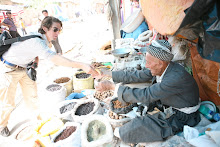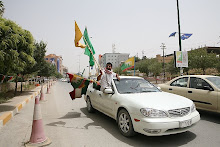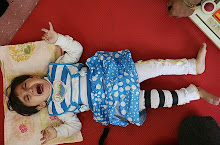Walking through the Libyan rebel city of Benghazi, it is impossible to miss the signs of fury. Countless buildings are charred, bullet holes mark the scenes of vicious gun battles and burnt out cars and tanks litter the roads. Each of these images evokes the scarred past of this city and of this country, but each is also a great symbol of achievement to the people. With great pride, they show off their victories, posing for pictures in Ghadaffi’s darkened cells, standing victorious on top of tanks and in true Arab fashion firing Kalahnikovs in the air. Throughout the city people flash peace signs in lieu of handshakes, and the old Libyan flag flies from every building and every car, replacing Ghadaffi’s own. There is a wonderful sense of freedom here.
With each street comes a different story. On one are the holes where unarmed men drove through barrack walls in selfless martyrdom, another where the explosives used to catch fish brought down guard towers. Near our hotel is the ransacked mansion where one of Ghadaffi’s notorious female bodyguard’s lived, and a few streets from that are the secret underground cells that were located only when muffled cries of prisoners were heard from grills in the ground. So thick were the doors that bulldozers had to dig them out from beneath.
The decimated palatial home of Ghadaffi himself which now sits surrounded by burnt out luxury cars, has also become a place of pilgrimage, and people flock here as they try to make sense of everything that has happened. Each of these ruins is of course a reminder of Ghadaffi’s repressive regime, but more importantly it is a reminder of the glorious rebellion and the great victory over the tyrant.
But herein lies the biggest problem and the biggest hurdle facing the rebels. So many people believe that by just having started this revolution, and just by winning back this city, that the war is already won. They seemed to believe that one by one cities would fall before them and that in no time at all they would be in Tripoli. It was their dream that in one fell swoop they could rid this country of its evils and bring about radical change, but how very wrong, and very naïve they have been. As we now watch a stalemate developing, it seems that despite their initial joy, they are only now realising how many lives will be lost and how far they have to go. It is also dawning on them, as Ghadaffi’s troops push to within 80 miles of Benghazi that maybe, just maybe, they might not win at all.
So it is that the joyous atmosphere felt throughout this city hides the reality of their predicament, and the scale of the troubles that lie ahead. Rebel fighters here must wake up, and realise that this fight is far from over. They must continue to train, but not just with weapons. They must learn how to hold a line, how to dig in and they must cease to scatter at the first sign of enemy attacks. They must learn how to communicate on the battlefield, and develop a system of ranks, and most importantly they must communicate with NATO. This lack of military knowledge is one of Ghaddaffi’s legacies and stems from his absolute paranoia. So worried was he about any uprising that no man ever received real training or fired a gun.
I have been to the training camps now set up around the city and I have watched men try to drill. In many cases they are no better than the afghan national police and speaking to people it almost seems as if too much planning and premeditation will somehow taint their pure revolution. Most would rather just drive straight at the enemy screaming ‘god is great’ in some kind of modern charge of the light brigade.
The rebels must also continue to offer a viable solution for a free libya and convince the West that they are not just ex Ghadaffi cronies. Most importantly they must not expect NATO to fight this war for them. The initial jubilation that was felt when NATO joined the fight is slowly disappearing as they realise that the west will not deliver the country to them on a plate, and that even if it wanted to, it is constrained by so many factors.
When it comes to the relationship with NATO, immense gratitude is still shown on the streets, and certainly in this city it is acknowledged that the initial airstrikes saved many people from being slaughtered. However this is slowly being overshadowed by a growing suspicion that bigger powers are at play and conspiring against them. After 40 years of brainwashing, and having watched Ghadaffi being propped up by western leaders it is not a big leap of imagination for them to make, and in evening press conferences the council spokesmen is now often forced to deny there is a rift between them. That this is not the case becomes harder and harder to believe, as people continue to ask where are the NATO bombs and why do they not do more.
The fact that recent NATO airstrikes have accidently destroyed rebel tanks have only strengthened this view and as confusion grows, so does anger. Now that Turkey has withdrawn it’s initial support for regime change Libyan rebels are feeling ever more isolated. NATO will only attack tanks outside cities but this is not enough for people here. In their eyes collateral damage is merely an unfortunate side effect.
The most widely spread theory here is that the world wants this country split in two. Most people on the streets believe that the west is scared of a powerful, oil rich and strictly Islamic Libya on it’s doorstep, and they may not be wrong. I am told again and again that it was Ghadaffi who split this country in two, in the same way that colonial powers divided and conquered, and that history is now repeating itself. I am also told that it is a ridiculous concept that Al Qaeda is waiting in the wings, but with possibly the worse use of words I have heard, somebody today told me “show me Al Qaeda and I will hang him, and I will take his head”.
One of the other big problems is the naivety about how the international community and NATO work. They do not understand why Ghadaffi’s troops cannot simply be wiped from the ground. They cite Kuwait as an example of this being done in the past, though none will tolerate ground troops on Libyan soil.
There is still hope in this country that the revolution will offer a new beginning, however day by day this dwindles. I suspect that what worries the west most, both in terms of Libya and the wider Middle East, is that when looking at history, it is rarely the people who start revolutions who finish them. Instead it is the most organised and cunning people who hijack otherwise noble causes. Looking at the people currently running this movement I believe there is much cause for concern., but I pray I am wrong.
Tuesday, 12 April 2011
Subscribe to:
Comments (Atom)














































